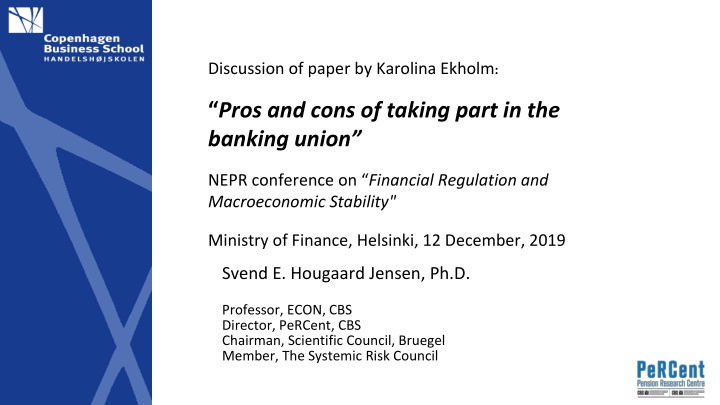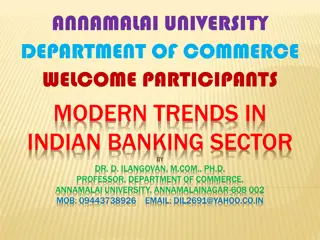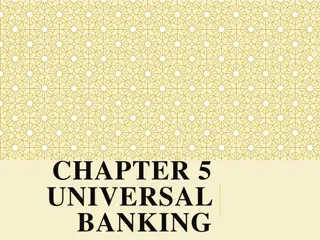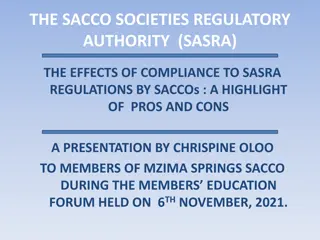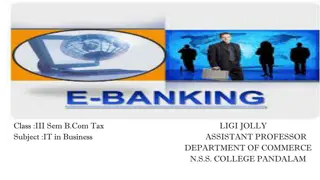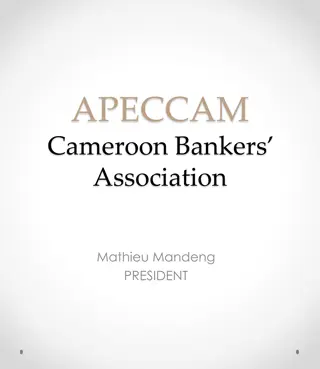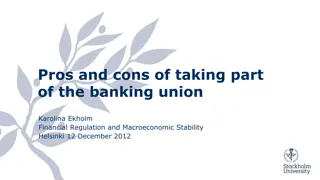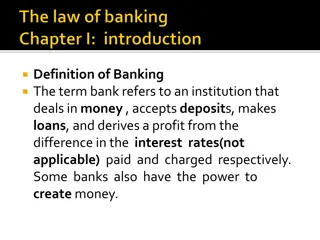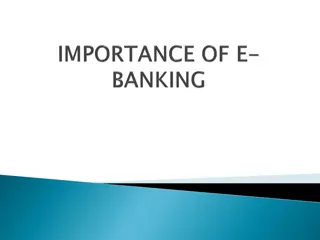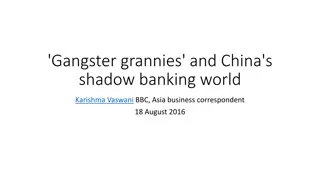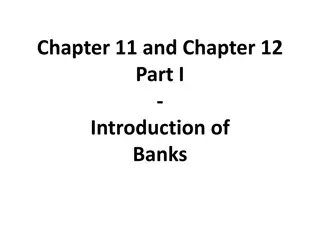Pros and Cons of Banking Union Participation: Insights from NEPR Conference
Discussion by Svend E. Hougaard Jensen on the paper by Karolina Ekholm regarding the advantages and disadvantages of joining the banking union, focusing on issues such as cross-border banking, coordination failure, and the doom loop. The paper analyzes the tensions between financial stability, cross-border policies, and national interests in the context of a banking union.
Download Presentation

Please find below an Image/Link to download the presentation.
The content on the website is provided AS IS for your information and personal use only. It may not be sold, licensed, or shared on other websites without obtaining consent from the author.If you encounter any issues during the download, it is possible that the publisher has removed the file from their server.
You are allowed to download the files provided on this website for personal or commercial use, subject to the condition that they are used lawfully. All files are the property of their respective owners.
The content on the website is provided AS IS for your information and personal use only. It may not be sold, licensed, or shared on other websites without obtaining consent from the author.
E N D
Presentation Transcript
Discussion of paper by Karolina Ekholm: Pros and cons of taking part in the banking union NEPR conference on Financial Regulation and Macroeconomic Stability" Ministry of Finance, Helsinki, 12 December, 2019 Svend E. Hougaard Jensen, Ph.D. Professor, ECON, CBS Director, PeRCent, CBS Chairman, Scientific Council, Bruegel Member, The Systemic Risk Council
Structure Rationale Orders of magnitude EUNEZ, mind the gap AOB
Rationale Coordination failure The academic literature has for long pointed to the need for a banking union when there is cross-border banking. Papers include Folkerts-Landau and Garber (NBER, 1992); Schoenmaker (Kluwer, 1997); Vives (JFSR, 2001). The trigger is similar to the inconsistent quartet in int l finance: free trade, capital mobility, fixed/managed exchange rates, and monetary policy independence (Padoa-Schioppa, 1982) Here s a financial trilemma, stating that the three objectives of financial stability, cross-border banking and national financial polices cannot be achi ved at the same time (Schoenmaker, 2011) More generally, the interests of home and host countries of cross-border banks are likely to deviate in distressed situations.
Rationale Cross-border banking Suppose country A is not only the home country of banks from country A but also host country of banks from country B. In order to provide financial stability in country A, the authorities in country A would need information (about capital and liquidity positions of distressed banks) from the supervisory authorities of country B. However, country B may have reasons to hold back such information. Failure to get this information, fully and on time, might (seriously) jeopardize the possibility for country A to deliver
Rationale Doom loop The actual trigger for introducing banking union in 2012 was the perceived need to avoid that tax payers are stuck with the bill when banks are rescued KE refers to Farbi and Tirole (2018) as an academic contribution showing how the risk of a doom loop may create a rationale for centralized supervision. The rationale for centralized supervision in this analysis arises partly because of cross-border externalities from sovereign default that are sufficiently large to justify transfers from foreign countries. For MU members, the MU can be at stake For for small stand-alone countries the risk may be much smaller, as
EUNEZ Ins vs Outs P3: In this article, I am going to discuss the pros and cons of being a member of the banking union, mainly from the perspective of a country that is not obliged to participate because of its adoption of euro as its currency . Effectively, the focus of the paper is a study of whether it would pay for Sweden (and
Cross-border penetration of European banking EU; % of total banking assets
Banking systems across three regions: BU, EU and US End-2014
Cross-border banking penetration in non-euro area Member States End-2014
Mind the gap SSM Preparatory (SSB) vs. ultimately (ECB). This is an important discussion of the location of the supervisory authority. So, EUNIZ has a problem here, by having NO representation on the ECB s governing council DK has two decades of experience with taking part in such an arrangement, by being de facto in the EZ when it comes to MP but not being in the governing council KE advocates in favour of letting SSB decide. Or establishing SSM outside of the ECB. Right? But: MP and FP are intertwined, as KE notes
Mind the gap SRM How about BRRD (Bank Recovery and Resolution Directive) which applies to all EU countries? In principle, the introduction of a common framework for bank resolution through BRRD should reduce the risk of inefficient outcomes regarding cross-border banks in financial distress. So, there may be a way out through BRRD without joining the BU? How far is BRRD from producing outcomes similar to those of BU?
Mind the gap SRM If EUNEZ joins BU, it will have to transfer an amount of contributions to the SRF corresponding to what it would have transferred if it had participated in the SSM and SRM at the outset. But if EUNEZ decides to leave, will the contributions transferred to the SRF be transferred back? Has it been finally agreed to use the ESM as a backstop for SRF? And if EUNEZ joins BU, is the treatment the same as for EZ members?
Mind the gap Why it s difficult to persuade the Scandinavian EUNEZ Clearest economic benefit of enlarging the banking union is the prospects of more efficient resolution of cross-border banks. But how are the gains distributed? Cherry picking countries (DK; SE) Could flexible membership be considered ( LIFO?)
Non-performing loans ratios (%) in the banking union Q2 2019
Mind the gap SSM Clearest cost is the loss of regulatory and supervisory independence . However, the size of that cost may be small in a world where financial markets are highly integrated. Well, should perhaps be counted as a benefit. The SSM has significant resources and will over time gain extensive experience in supervising different types of institutions (Beck, 2019). The fact that it is located far from most of the institutions that it supervises may also reduce the risk of regulatory capture. To me, this may be a key benefit of joining the BU perhaps the most important one! The SSM, based in the ECB, would be able to not only attract talent and develop seniority, having a team of very experienced, highly professional and well-paid staff. FSAs in smaller EUNEZs typically have high turnover rates, with the best and most ambitious staff moving to the private financial sector. But supervision is complex, and make heavy demands on skills to match the expertise
